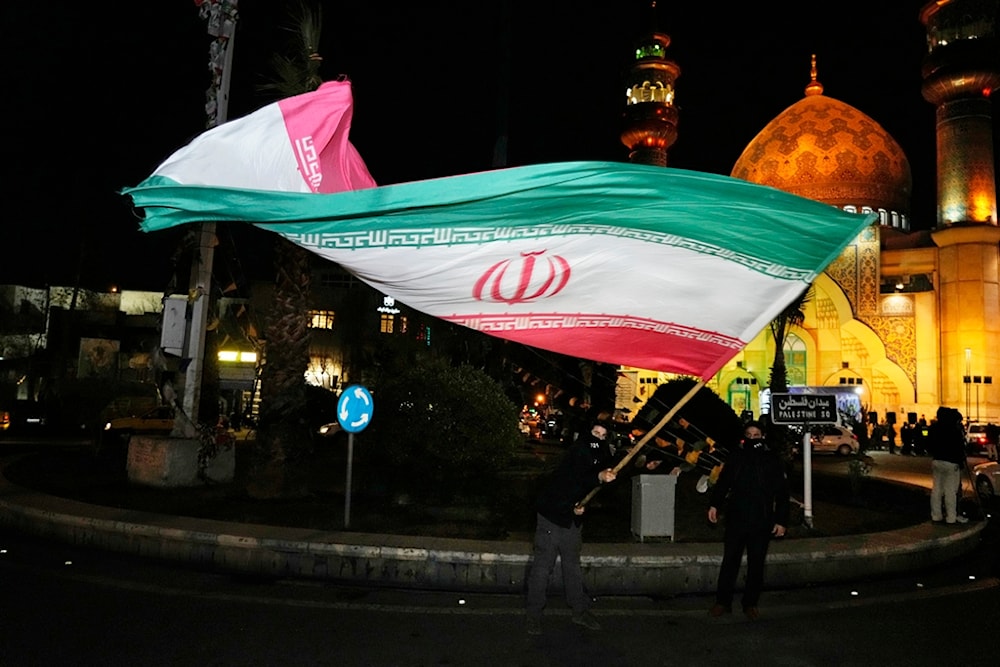Confidentiality in talks with US aligns with national interests: Iran
In a statement, Tehran emphasizes that this approach "will continue as long as the country's interests require it."
-
 A demonstrator waves an Iranian flag in a celebration for the announcement of a ceasefire deal between Hamas and "Israel", at the Felestin (Palestine) Sq. in Tehran, Iran, Thursday, Jan. 16, 2025 (AP)
A demonstrator waves an Iranian flag in a celebration for the announcement of a ceasefire deal between Hamas and "Israel", at the Felestin (Palestine) Sq. in Tehran, Iran, Thursday, Jan. 16, 2025 (AP)
Maintaining the confidentiality of negotiations and international correspondence and refraining from disclosing details of diplomatic processes is a professional practice aligned with national interests, the Iranian Foreign Ministry pointed out on Sunday.
In a statement in response to media reports regarding the method of message exchanges between the US and Iran, the ministry emphasized that this approach "will continue as long as the country's interests require it."
"Insisting on publicizing ongoing correspondence and interactions between states, using misleading terms such as concealing information from the people, is, at best, unnecessary noise aimed at creating psychological tension in society," the statement indicated.
Tehran underscored that "the great Iranian people should rest assured that the Foreign Ministry will continue its critical mission with focus and determination during this crucial, decisive time, without being influenced by such clamor."
In a related context, Iranian government spokesperson Fatemeh Mohajerani confirmed that indirect negotiations with the US have been placed on the agenda.
A couple of days ago, Iranian Foreign Minister Abbas Araghchi announced that his country had conveyed its response to a letter from US President Donald Trump through Oman.
Speaking to IRNA on Thursday, Araghchi confirmed that Iran’s official reply had been delivered via the appropriate diplomatic channel.
“The official response comprises a letter wherein our viewpoints regarding the status quo and Mr. Trump’s letter have been fully laid out and relayed to the other side,” he indicated.
Trump had initially sent his letter to Iran on March 12 via the United Arab Emirates (UAE). While the content of the letter has not been officially disclosed, the US president has indicated that he proposed opening negotiations for a new nuclear agreement. Trump unilaterally withdrew the United States from a previous deal with Iran in 2018.
Araghchi reiterated on Thursday that Iran remains open to indirect negotiations but will not engage in direct talks while subjected to the US' "maximum pressure" policy and military threats.
“Indirect negotiations, though, can continue, as they existed in the past,” he added.
'More of a threat than an offer'
Last week, Araghchi said Trump's letter was "actually more of a threat" than an offer.
Trump's letter reportedly set a two-month deadline for Iran to agree to a new nuclear deal or face potential military action.
Speaking to Iranian state television, the Iranian foreign minister noted that while the letter appeared to present opportunities, its tone was ultimately threatening.
He emphasized that Iran’s refusal to engage in direct talks with the US is a tactical decision rather than a strategic stance.
He noted that ongoing discussions between Iran and the three European countries—France, Germany, and Britain—effectively serve as indirect negotiations with the United States.
“In circumstances where there is ‘maximum pressure,’ no one in their sound mind would enter into direct talks,” the top Iranian diplomat said at the time.
“The format of negotiations is always relevant in diplomatic relations… For now, our tactic and method is to have indirect negotiations.”
On February 4, Trump signed a presidential memorandum reinstating the "maximum pressure" policy on Iran, despite his claims of willingness to engage diplomatically with Tehran.
Meanwhile, the Leader of the Islamic Revolution and the Islamic Republic of Iran, Sayyed Ali Khamenei, has ruled out negotiations with the United States, asserting that Iran does not trust Washington to honor any commitments.
Read more: Iran says US letter opened new window for diplomacy

 4 Min Read
4 Min Read








